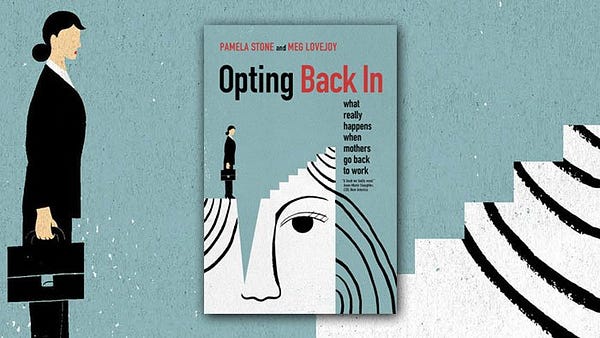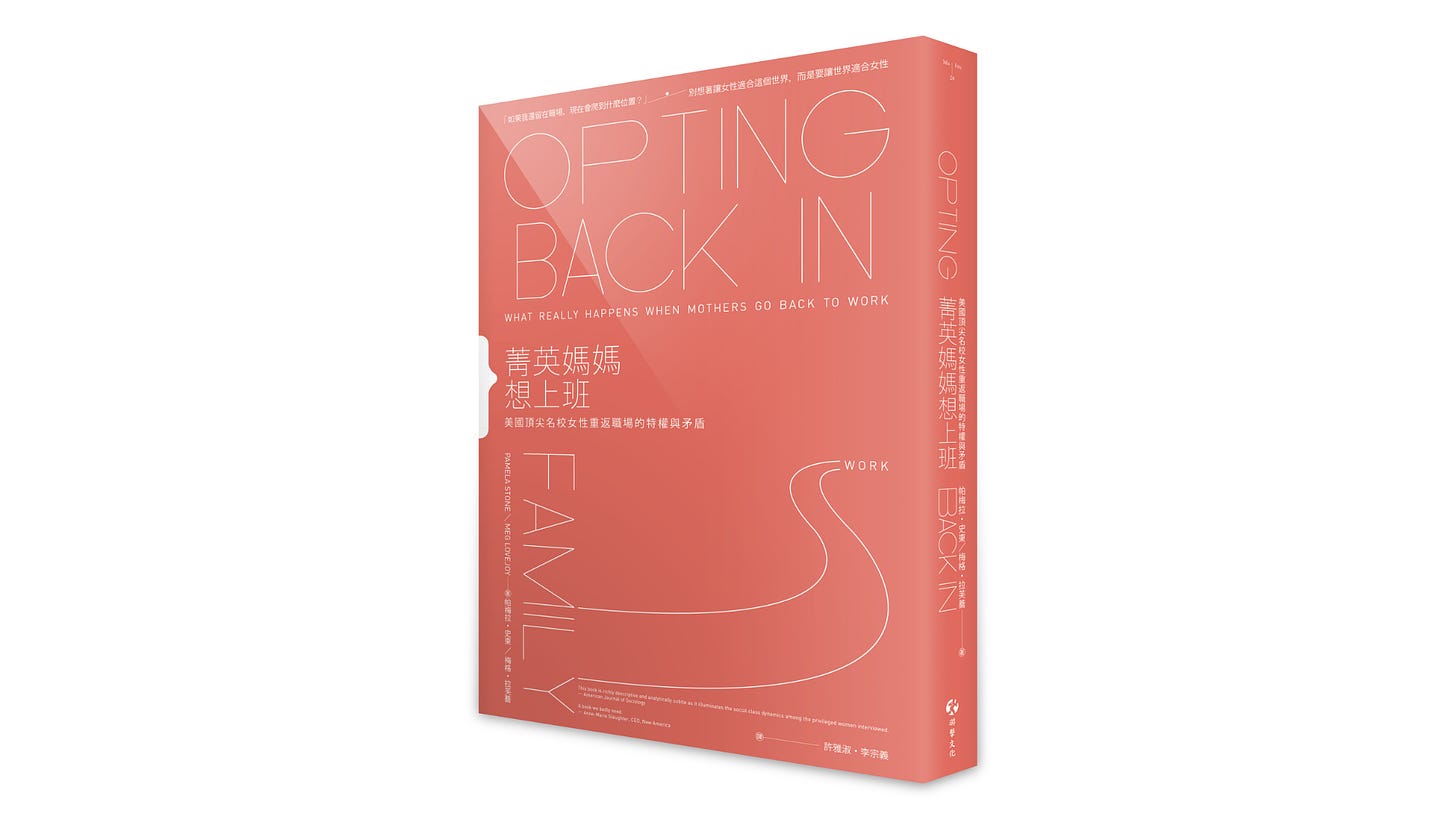Original link: https://sehseh.substack.com/p/4b5
When mothers are kicked out of the workplace by the overwork culture, juggling family work is actually a false issue. (Pixabay)
Text / Pamela. Stone (Pamela Stone), Meg. Meg Lovejoy
In the world of professional and supervisory work, a culture of burnout has accelerated. This culture, dovetailing with the model of the ideal employee (that is, a male employee) who progresses slowly, undermines the viability of flexible work and creates what many say is a real barrier to motherhood.
In the past, mothers were prohibited by law from working, even in the most feminine profession of teaching. Women are now being hired into traditionally male fields, such as law and business, and no one is forcing them out, but working conditions (especially at top-tier companies) make it difficult for women who are mothers (or want to be mothers) Stay with the company.
This new barrier to motherhood, through overtime and hostility to flexible working, has reduced the number of working mothers who stay at work while exacerbating the interruptions and pauses in women’s careers that are now the norm.
walk with us
” World Walk” is committed to bringing you/you international news and opinions that are different from traditional perspectives,
Inviting you / you to join the membership will actually help us present a different world view.
Starting from 1 Taiwan dollar to support walking
Quit the workplace, the “choice” of elite mothers?
While these women recounted the relentlessness of workplace stress and the failure of their best efforts to develop coping strategies, they rarely felt sacrificed or discriminated against. Although they personally feel the punishment of being a mother, because they have internalized the norms of their profession, not many of them feel hurt by prejudice and discrimination.
Their privilege of not worrying about food and clothing, knowing where they are, their perfectionist orientation, and their strong personal agency are making them adopt a narrative of choice. 70% of the interviewees often mentioned “choice” during the interview, such as “active choice”, “professional choice” and other words. Women often stress that any punishment they receive at work is based on their personal actions and preferences. They often frame their decisions to abandon their careers as “feminists,” pointing out that third-wave feminism is primarily a personal choice (as opposed to second-wave feminism’s focus on structural gender equality).
In this book, people in their 30s mention twice as much by choice as people in their 40s. A typical interviewee was Melissa Wyatt, 34, a former fundraiser who switched from full-time to part-time before quitting: “I would say I’m a feminist. I like today’s The fact that most women have a choice, I think it’s very important.”
The contradiction between the fact that women are under pressure (lack of choice) and the rhetoric of choice (women say their decision to quit their job is a choice) is what I call the choice gap. Behaviorally, this can be seen as the difference or gap between what women want to do (continue their careers) and what women actually do (leave the workplace). The narrative of choice focuses on individual preferences and ignores the barriers women, even the capable and privileged, face in the face of powerful institutions.
Perhaps the most extreme example of the claim of self-choice is when women pause or end careers in which they have devoted so much energy and passion, and are said to have chosen to leave the workforce. Our analysis shows that once women become mothers in prestigious, powerful, and lucrative occupations, their options for remaining in this demanding job are limited.
The wealth of the family allows them to choose to leave the workplace, but our research shows that this “choice” is not out of personal preference, but because the nature of their work requires “going all in” and thus forces them to be in the workplace. The choice between giving it your all and quitting the workplace.
Who is the “ideal employee” who does not have children? Who is the culturally presupposed family caregiver?
Our main finding—that high-achieving women’s decisions to interrupt or suspend their careers are strongly influenced by working conditions (combined with persistent gender inequalities in the gender And a growing body of research confirms it. A recurring theme in the research is that a male-ideal work culture plays a key role in the workplace, which discourages flexible work and further penalizes female professionals who seek it.
A study of the top three professional jobs (law, medicine, and business) in which women are heavily invading found that the highest percentage of women opting out was in business, followed by law, and the lowest in medicine. The difference between the three is that business and legal work hours are longer and inflexible, while healthcare has become more flexible as it moves from the private practice model to large group practices such as health care organizations (HMOs).
Another study of high-achieving women also attributed the decision to quit to job and organizational factors, such as inflexibility, discrimination, and lack of opportunities for advancement. This echoes the efforts of our subjects, who tended to stay in work if women who resigned were offered flexibility and reduced (that is, reasonable) hours. Research on women in finance also found that women leave because of a male workplace culture combined with inflexible working conditions, especially expecting longer hours and being on call.
Women returning from maternity leave find their responsibilities have been reduced, their status has been downgraded, and their jobs have been axed, similar to our research finding that women often switch to part-time when they return from parental leave . Another study concluded that women, especially professional women, are “thrown out” of the workplace when they become mothers.
Their research found that women who worked more flexible jobs before becoming mothers were more likely to stay in the workforce. The study also found that women who belong to organizations that support work-family balance are less stigmatized when they become pregnant and become mothers, and those women are less likely to leave the workforce after having children.
Our main findings, and evidence for this, is that specifically long working hours or working overtime have a profound effect on women’s exit from the workforce.
Long working hours or overtime work have a profound impact on women’s withdrawal from the workplace. (Pixabay)
Sociologist Youngjoo Cha analyzed a national sample of data and found that mothers (rather than men or women without children) who work more than 50 hours a week are more likely to leave male-dominated occupations, instead of changing to non-male To go to work in a dominant industry is to quit the labor force. This confirms our research—that long hours and motherhood are incompatible—that among women who worked long hours, mothers were 52 percent more likely to leave the workforce than women without children.
People who work part-time, whether male or female, are more likely to quit male-dominated jobs, such as those we observed, that enforce ideal employee norms and thus penalize part-timers. If we only look at resigned workers (choose to leave), Che Yingzhu found that the factor of overtime work has a greater impact on mothers who work in male-dominated occupations. They are three times more likely to quit the labor force than mothers who work in other fields. Men who work overtime, such as the husbands of our interviewees, are less likely to quit.
Since the effects of overtime work were only seen among mothers working in male-dominated occupations, Yingzhu Cha concluded (like us) that “the workplace gives pressure, played an important role.”
Subsequent research also mentioned that the husband’s high working hours have an impact on women’s decision to resign. One study found that women whose husbands worked overtime (50+ hours a week) were more likely to leave the workforce than women whose husbands commuted regularly. Another study by Che Yingzhu also found that women whose husbands work long hours are more likely to resign than women with children. The study re-emphasizes the link between long working hours and the enduring cultural assumption that women are primary caregivers.
Hope for a return to work at home
Many of the women in our study had reduced their hours of work before deciding to quit their jobs, thereby reducing their contribution to overall household income. The study found that women who earned a smaller share of household income were more likely to leave the workforce.
Our explanation is that wives were able to stay home because they were backed by the husband’s higher income—more of a reason for the husband’s decision to keep working than a direct reason for the woman to quit. Still, women often point to their lower earning power as an explanation for why their husbands cannot seriously consider quitting their jobs when they do, and to justify why they prioritize their husbands’ careers.
When we first interviewed the subjects, they were full-time housewives. Not only do they have to face the sudden end of their long-sought careers, but they also have to adapt to a new and uncertain world of housewives that most of them never imagined in their life plans.
Transitioning into a stay-at-home world is as big and challenging as transitioning out of a work world. Women are embracing the life of housewives, but only a few have completely given up hope of returning to the workforce.
Looking to the future, these women no longer have the confident voice of the past. They, like the women at the back-to-work panel in the conference hall, are concerned that their hopes of returning to the workforce will fade as they spend time at home. (Finish)
(This article is included in “Elite Moms Want to Work: The Privileges and Contradictions of Women Returning to the Workplace at Top U.S. Schools” , published with the authorization of Guerrilla Culture, and the title and chapters were edited and adapted by “World Walk”.)
“Elite Moms Want to Work: The Privileges and Contradictions of Women Returning to the Workplace from America’s Top Prestigious Schools”, Pamela. Stone (Pamela Stone), Meg. Meg Lovejoy, translated by Xu Yashu and Li Zongyi (provided by Guerrilla Culture)
There are important stories about you / you haven’t read in the world. We focus on global issues from a gender perspective, complementing stories about dilemmas, breakthroughs, connections, and changes that traditional power perspectives ignore.
Subscribe to support”World Walk” , thank you/you for moving forward together.
See more member exclusive benefits 
This article is transferred from: https://sehseh.substack.com/p/4b5
This site is only for collection, and the copyright belongs to the original author.




